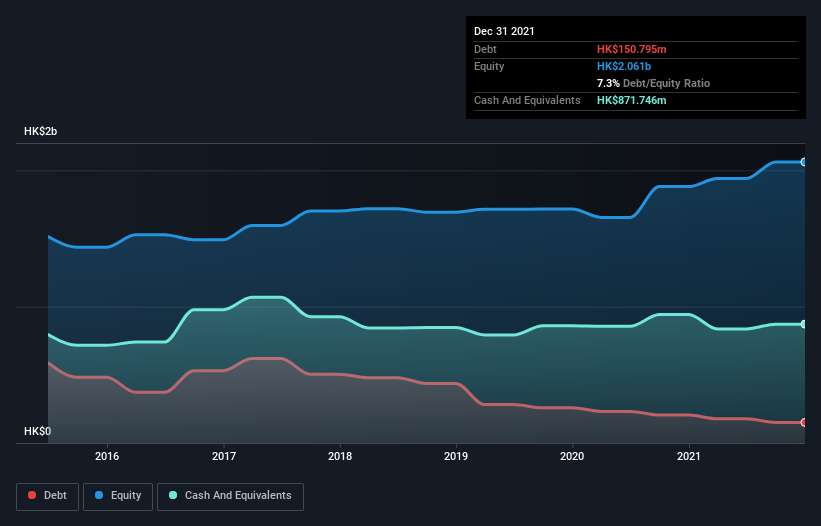
Legendary fund manager Li Lu (who Charlie Munger backed) once said, 'The biggest investment risk is not the volatility of prices, but whether you will suffer a permanent loss of capital.' It's only natural to consider a company's balance sheet when you examine how risky it is, since debt is often involved when a business collapses. We note that IPE Group Limited (HKG:929) does have debt on its balance sheet. But the real question is whether this debt is making the company risky.
Why Does Debt Bring Risk?
Debt assists a business until the business has trouble paying it off, either with new capital or with free cash flow. Ultimately, if the company can't fulfill its legal obligations to repay debt, shareholders could walk away with nothing. However, a more common (but still painful) scenario is that it has to raise new equity capital at a low price, thus permanently diluting shareholders. By replacing dilution, though, debt can be an extremely good tool for businesses that need capital to invest in growth at high rates of return. The first step when considering a company's debt levels is to consider its cash and debt together.
Check out our latest analysis for IPE Group
What Is IPE Group's Net Debt?
The image below, which you can click on for greater detail, shows that IPE Group had debt of HK$150.8m at the end of December 2021, a reduction from HK$204.6m over a year. However, its balance sheet shows it holds HK$871.7m in cash, so it actually has HK$721.0m net cash.

A Look At IPE Group's Liabilities
Zooming in on the latest balance sheet data, we can see that IPE Group had liabilities of HK$362.5m due within 12 months and liabilities of HK$32.2m due beyond that. Offsetting these obligations, it had cash of HK$871.7m as well as receivables valued at HK$325.5m due within 12 months. So it actually has HK$802.6m more liquid assets than total liabilities.
This excess liquidity is a great indication that IPE Group's balance sheet is almost as strong as Fort Knox. Having regard to this fact, we think its balance sheet is as strong as an ox. Succinctly put, IPE Group boasts net cash, so it's fair to say it does not have a heavy debt load!
Better yet, IPE Group grew its EBIT by 208% last year, which is an impressive improvement. That boost will make it even easier to pay down debt going forward. When analysing debt levels, the balance sheet is the obvious place to start. But it is IPE Group's earnings that will influence how the balance sheet holds up in the future. So if you're keen to discover more about its earnings, it might be worth checking out this graph of its long term earnings trend.
Finally, a company can only pay off debt with cold hard cash, not accounting profits. While IPE Group has net cash on its balance sheet, it's still worth taking a look at its ability to convert earnings before interest and tax (EBIT) to free cash flow, to help us understand how quickly it is building (or eroding) that cash balance. Over the last three years, IPE Group actually produced more free cash flow than EBIT. That sort of strong cash generation warms our hearts like a puppy in a bumblebee suit.
Summing up
While it is always sensible to investigate a company's debt, in this case IPE Group has HK$721.0m in net cash and a strong balance sheet. And it impressed us with free cash flow of -HK$29m, being 197% of its EBIT. The bottom line is that IPE Group's use of debt is absolutely fine. When analysing debt levels, the balance sheet is the obvious place to start. But ultimately, every company can contain risks that exist outside of the balance sheet. For example, we've discovered 4 warning signs for IPE Group (1 is a bit concerning!) that you should be aware of before investing here.
Of course, if you're the type of investor who prefers buying stocks without the burden of debt, then don't hesitate to discover our exclusive list of net cash growth stocks, today.
New: AI Stock Screener & Alerts
Our new AI Stock Screener scans the market every day to uncover opportunities.
• Dividend Powerhouses (3%+ Yield)
• Undervalued Small Caps with Insider Buying
• High growth Tech and AI Companies
Or build your own from over 50 metrics.
Have feedback on this article? Concerned about the content? Get in touch with us directly. Alternatively, email editorial-team (at) simplywallst.com.
This article by Simply Wall St is general in nature. We provide commentary based on historical data and analyst forecasts only using an unbiased methodology and our articles are not intended to be financial advice. It does not constitute a recommendation to buy or sell any stock, and does not take account of your objectives, or your financial situation. We aim to bring you long-term focused analysis driven by fundamental data. Note that our analysis may not factor in the latest price-sensitive company announcements or qualitative material. Simply Wall St has no position in any stocks mentioned.
About SEHK:929
IPE Group
An investment holding company, engages in the manufacture and sale of precision metal components and assembled parts for use in automotive parts, hydraulic equipment, electronic equipment component, and other devices.
Flawless balance sheet with acceptable track record.
Market Insights
Community Narratives



